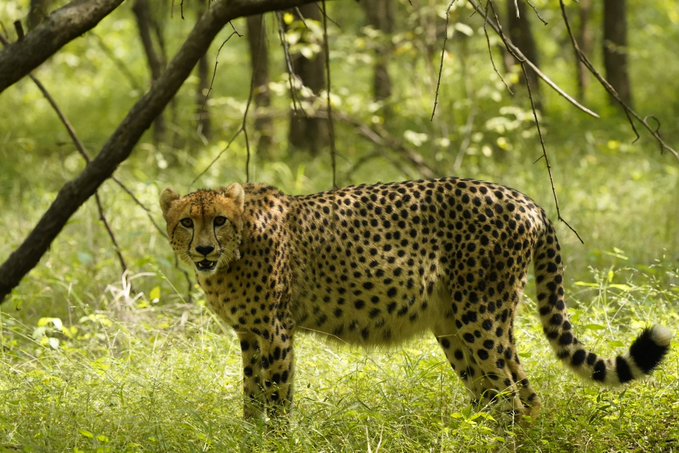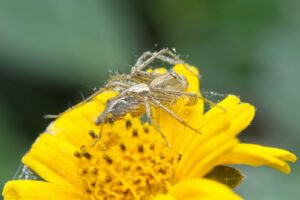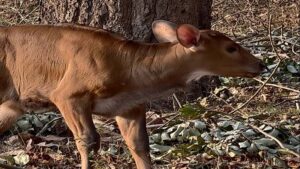
Exciting news is emerging from Kuno National Park (KNP) in Sheopur district, Madhya Pradesh. A pregnant female cheetah is expected to give birth to cubs soon, bringing a wave of joy and optimism to wildlife enthusiasts and conservationists alike.
This significant development was shared by the Chief Minister of Madhya Pradesh, Mohan Yadav, on his social media platforms, accompanied by a photo of the expectant mother.
The pregnancy of the female cheetah is being hailed as a major milestone in the ongoing “Cheetah Project.” CM Yadav took to the social media platform ‘X’ (formerly Twitter) late Saturday night to share this wonderful update. He expressed his delight, stating that the forthcoming birth of cheetah cubs is not only a joyful occasion but also a reflection of the project’s growing success.
In his post, CM Yadav wrote, “Happiness is about to arrive in Kuno. A female cheetah is set to give birth to cubs soon in Kuno National Park.” He further added that this news symbolizes a significant achievement for the ‘Cheetah Project,’ which was launched under the leadership of Prime Minister Narendra Modi. The project is continuously contributing to the restoration of ecological balance and promoting wildlife conservation in the region.
The reintroduction of cheetahs in India has been a highly anticipated project, with Kuno National Park playing a central role in this effort. Cheetahs were declared extinct in India in 1952, and their reintroduction is aimed at restoring the balance of the ecosystem by reintroducing this top predator. The “Cheetah Project” began with the introduction of several cheetahs from African countries, and their successful acclimatization has been a point of pride for conservationists.
This pregnancy is being seen as a further indication that the cheetahs have adapted well to their new environment. The birth of cheetah cubs in the wild will mark a significant victory in India’s efforts to restore its cheetah population and enhance biodiversity.
According to park officials, 17 cubs have been born in India since the cheetah reintroduction program began, out of which 12 have survived. With the impending birth of the new cubs, the total number of cheetahs, including cubs, in Kuno National Park will rise. This growth in population is a testament to the careful planning and monitoring by conservation authorities, who have been working tirelessly to ensure the success of this program.
Kuno National Park, located in the heart of Madhya Pradesh, has emerged as a sanctuary for these majestic cats. The park’s vast expanse of grasslands and forests provides an ideal habitat for cheetahs, and the birth of new cubs is expected to draw even more attention to this remarkable wildlife conservation initiative.
Cheetahs play a critical role in maintaining the balance of ecosystems by controlling herbivore populations. Their return to India’s forests is expected to help restore the natural food chain, which had been disrupted by their absence for several decades. The “Cheetah Project” is thus not only about reintroducing a species but also about reviving the ecological harmony of the region.
The anticipated birth of cubs will boost the morale of conservationists and wildlife enthusiasts, providing tangible evidence that efforts to revive the cheetah population are bearing fruit. This development will also help raise awareness about the importance of wildlife conservation and the need to protect endangered species.







